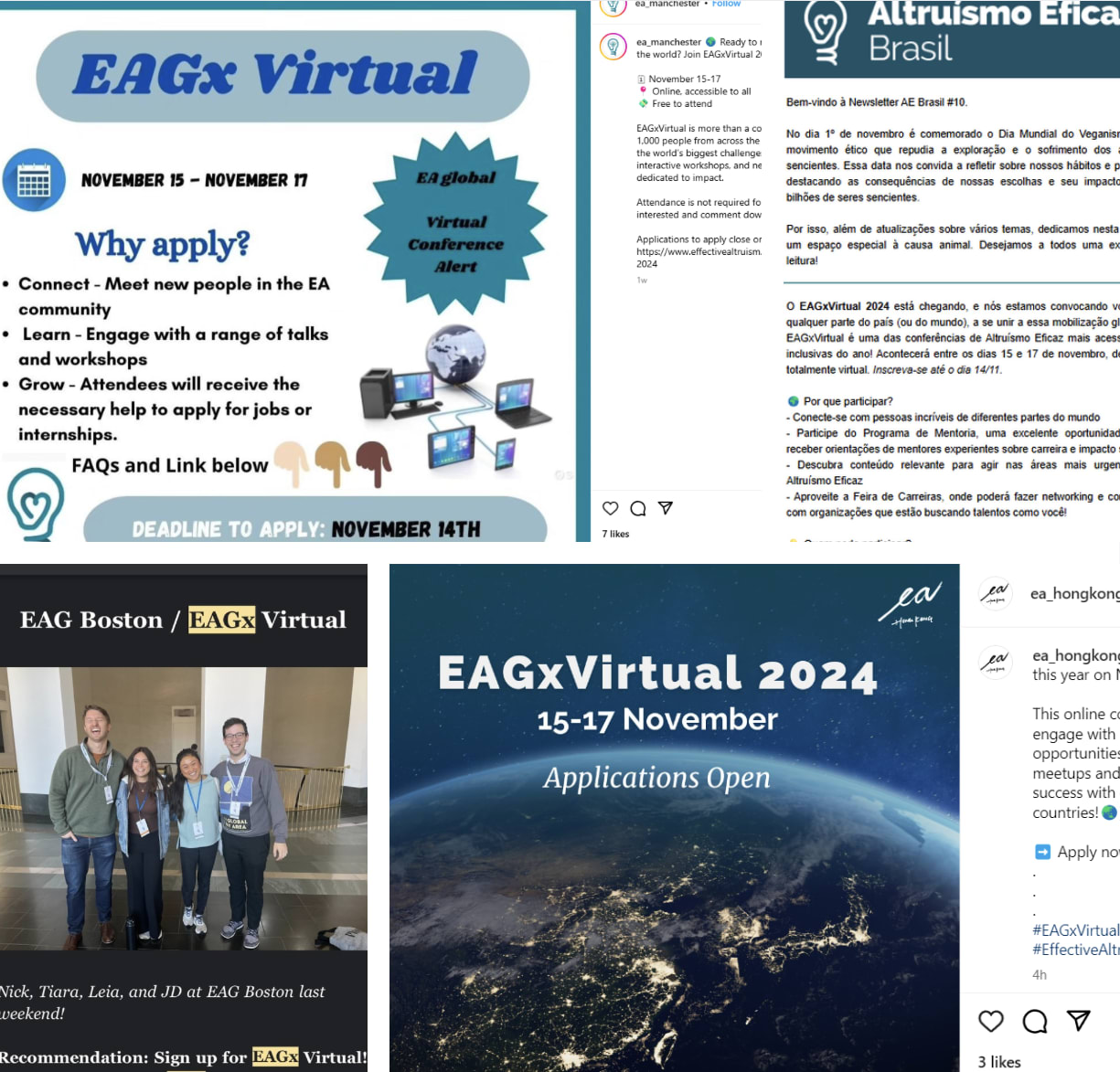Tl;dr: This weekend (15-17 November), we will broadcast 30+ hours of live EAGxVirtual 2024 speaker talks! Everyone, including those that aren’t registered for the conference, can watch.
View the schedule and watch live here. Comment on this post to discuss the livestream.
This is part of our goal of making content and opportunities accessible to the global EA community.
The livestream is only a portion of the programming available to registered attendees. Full access includes 20+ office hours, 25+ meetups, workshops, and access to Swapcard networking with 1000+ attendees. Sign up to get notified about the next virtual conference.
———
In our announcement post, we explained why we are hosting a virtual event – to connect the global EA community. We’ll do this by providing access to EA content, the ability to meet others through Swapcard 1-on-1s and cause area/affinity group meetups, giving visibility to high-impact opportunities, and other unique programming.
In our update post, we shared a preview of the programming, highlighting a few speakers, the organisation fair, meetups, lightning talk session, and mentorship program.
What we are excited about this weekend
Welcoming EA community members from 86 countries!
- 27 people are the only ones who registered from their country, so this may be one of the best opportunities they have to engage with EA ideas and community.
Seeing a record 100+ content sessions
- While in-person EAG events emphasize 1:1s, we are less certain this is the best focus for EAGxVirtual. Many attendees are newcomers to EA, so we’ve designed programming to help them start engaging with ideas and connect with their regional communities. We don’t have all the answers yet and hope to get some more in the coming weeks.
Why we’re publicly livestreaming the talks
EAGxVirtual 2024 offered free registration, so it might seem like everyone interested would already be signed up.
We’ve actually received emails from attendees asking if they should attend. For every question we received, there are likely others who have the same doubts. Here are some hesitations that people have expressed:
- They cannot commit to the entire weekend or confirm their schedule in advance
- Imposter syndrome/don’t feel qualified enough to attend
- Don’t want to take the place of others
- Uncertainty about the experience level/age of attendees
- Past online events didn’t meet expectations
We understand that people have different work and life circumstances. So in the interest of accessibility and transparency, we decided it was worthwhile to trial publicly streaming the live talk sessions. We welcome your feedback on this decision.
This does not provide access to the other portions of the conference, such as the virtual meetups, 1:1 booking function in Swapcard, or office hours.
These livestreamed talk recordings will be instantly available on Swapcard after a session ends.
Watch the livestreamHuge thanks to the EA Community for supporting us
Although the conference hasn’t ended, we’re already so grateful to the local EA groups, partner organizations, volunteers, and community members making this weekend possible.
Here are a few screenshots of from EA Manchester, AE Brasil, EA Christians, and EA Hong Kong 💙

How to participate
We hope that EAGxVirtual 2024 will help to seed conversations, collaborations, and new opportunities--even for people who don't attend.
- For registered attendees:
- Besides watching the content sessions, we encourage you to attend meetups, book 1:1s, and engage with other attendees
If you’ve attended this year’s conference, share your experience in this post's comments. It may help provide guidance or confidence to someone else in a similar situation
- For people watching the livestream only:
- Sign up to get notified about the next virtual conference
- Comment on this post below 👇 to discuss the livestreamed sessions




A number of people invited me to 1:1s to ask me for career advice in my field, which is software engineering. Mostly of the "how do I get hired" kind rather than the "how do I pick a career path that's most in line with EA strategic priorities" kind that 80,000 Hours specializes in. Unfortunately I'm not very good at this kind of advice (I haven't looked for a new job in more than eight years) and haven't been able to find anywhere else I could send people to that would be more helpful. I think there used to be an affinity group or something for EA software engineers, but I don't think it's active anymore.
Anyone know of anything like this? If not, and if you're the kind of person who's well-positioned to start a group like this, consider this a request for one.
In addition, I used to lead the EA Public Interest Tech Slack community, which was subsequently merged into the EA Software Engineers community (the Discord for which still exists btw). All of these communities eventually got merged into the #role-software-engineers channel of the EA Anywhere Slack.
I think there was too much fragmentation among slightly different EA affinity groups aimed at tech professionals - there was also EA Tech Network for folks working at tech companies, which I believe was merged into High Impact Professionals.
I'm not sure why the ... (read more)